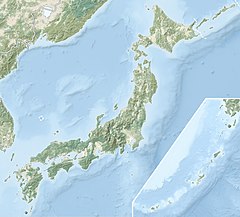Eigen-ji
| Eigen-ji | |
|---|---|
永源寺 | |
 Main Hall | |
| Religion | |
| Affiliation | Buddhist |
| Deity | Yotsugi Kanzeon Bosatsu (Avalokiteśvara of prosperity to descendants) |
| Rite | Rinzai school |
| Status | Head Temple |
| Location | |
| Location | 41 Eigenjitakano-chō, Higashiōmi-shi, Shiga Prefecture |
| Country | Japan |
| Geographic coordinates | 35°04′50″N 136°19′12″E / 35.08057°N 136.31992°E |
| Architecture | |
| Founder | Sasaki Ujiyori and Jakushitsu Genkō |
| Completed | 1361 |
| Website | |
| Official website | |
Eigen-ji (永源寺) is a Buddhist temple in the Eigenji-Takano neighborhood of the city of Higashiōmi, Shiga Prefecture, Japan. It is the head temple of one of the 14 autonomous branches of the Rinzai school of Japanese Zen
History
[edit]Eigen-ji was founded in 1361 by the famous poet and roshi Jakushitsu Genkō under the sponsorship of the shugo of Ōmi Province, Sasaki Ujinori. At its head, the temple had over 2000 priests and 56 chapels on the mountainside. During the Onin War, many priests from the Kyoto Gozan temple sought sanctuary at Eigen-ji; however, the temple burned down in 1492 and again in 1563 and fell into decline afterwards. According to a tradition in Inabe city in Mie Prefecture, a priest from Eigen-ji escaped over the Suzuka Mountains into Ise Province bearing the temple's treasures when the temple was destroyed by Takigawa Kazumasa on orders of Oda Nobunaga in 1570; however, there are no records of such an event at Eigen-ji itself.
During the Edo period, the temple was revived by an abbot named Isshi Bunshu from Myōshin-ji in Kyoto, under the sponsorship of Emperor Go-Mizunoo, his consort Tofukumon-in and Hikone Domain. IN 1873, he joined the Tofuku-ji subject of the Rinzai school, but became an independent branch in 1880.
Present day
[edit]Today it is the head temple of the Eigen-ji branch of Rinzai Zen and governs more than 120 temples and one monastery.[1][2] The temple is a noted spot for hanami in spring, with a variant of the sakura known as the "Eigenji-zakura", and for viewing of maple leaves in the autumn.
Gallery
[edit]-
Sanmon
See also
[edit]References
[edit]- Dumoulin, Heinrich (2005). Zen Buddhism: A History. World Wisdom, Inc. ISBN 0-941532-90-9.
External links
[edit]- "Head Temples - Eigen-ji". Official Site of the Joint Council for Japanese Rinzai and Obaku Zen. Retrieved 20 January 2008.
- Shiga-Biwako Tourist Information







